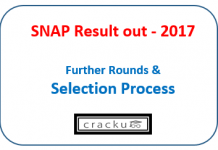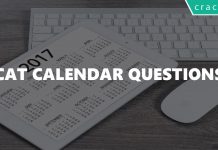How to solve TITA Para jumbles in CAT VARC? Excellent tips
Para Jumbles for CAT (without options), like the Reading Comprehension, also tests one’s comprehension skills. Over the past few years, we can observe that there are around three to four questions that are asked on Parajumbles, in the CAT exam. They involve rearranging the paragraph based on various clues and techniques. Let’s discuss some excellent tips to solve Para jumbles in CAT VARC.
Like in RC’s the key here is to identify the chain of thought. Once the candidate is able to identify the central point and chain of thought, solving Parajumbles for CAT without options is not very tough.
But it isn’t as easy as it sounds. To get better at para jumbles, read good quality articles, essays or well-written books. The most effective way for a student to improve in the VARC is to practice as many questions as they can. The approach that’s best recommended involves the following steps and is fairly straightforward.
Also, Try checking out previous year papers of CAT to know about the level of questions that appear in Para jumbles in the VARC section.
Tips and Tricks to solve Parajumbles for CAT
The essential tools you must have in your toolkit to tackle Para Jumbles questions are as follows:
Understand the chain of thought: This is a sure-fire way of solving Parajumbles (without options). If you understand the paragraph, its purpose, and the central idea, you will know how to order the sentences.
Pick the Central theme of the passage: The first thing that you want to do when presented with a parajumbles question is to identify the central theme of the passage. This may seem trivial but having the correct theme for the passage goes a long way in solving the parajumble. If you identify the central idea, then there is only one logical way to order the sentences- the order that would convey that idea in the easiest way.
Most sentences can be classified as the introduction to the idea, arguments for, arguments against, author’s opinion or personal stand on the subject, information regarding a subject, etc. Identify the purpose of each statement, and it would determine its position in the paragraph.
Identify the opening sentence: The opening sentence is most likely to be the one which introduces the subject, topic, place, of the passage. Though not necessarily true for every parajumble, it often lacks a pronoun like he, she, it, they, them, etc. since we have to introduce a subject first. If the passage is about the life of a particular person, the opening statement would mostly be the one in which he/she is named. All subsequent sentences would use the pronoun ‘he/she’ to refer to him.
Once you shortlist a couple of sentences for the opening sentence, investigate further. Look for proper nouns and names. Use of “the” in the first sentence is uncommon. For example, if the sentence has “ the university” it refers to a university that was already mentioned – so, that can’t be the first sentence.
Join 30K MBA Aspirants Telegram Group
Highlight the clues in every sentence: Once the opening sentence is shortlisted, look for clues in every other sentence. Connecting phrases like- and, but, however, moreover, nonetheless, etc., and articles like- a, an and the., plus pronouns like- he, she it, they, them, etc., and adjectives like- heavier, lighter, poor, etc., give lots of hints about the order of the sentences. So, those are what we want to highlight now.
Determine qulifier / qualified sentences: Qualifier is a sentence that gives a hint about the next sentence. The next sentence is called a qualified sentence. Using the hints we determine as many qualifiers and qualified sentences as we can. Piece them together to get a coherent paragraph.
Identifying the concluding sentence: The sentence that either sums up the thoughts expressed in the paragraph or brings the chain of thought to its logical conclusion is most likely to be the last line of the paragraph. Sentences that are inferences are more likely to be the last line as compared to facts and judgements.
Download Verbal Ability Tips for CAT PDFs
Identifying links
Links help you identify the internal structure of the paragraph. Try to make blocks of sentences by finding two or more sentences that are logically related. You can identify sentences that are linked by using the following clues:
- Transition words: Transition words are an absolute essential tool for Parajumbles for CAT, especially if you can make neither head nor tail of a paragraph. Words like Indeed, Moreover, However, Also, In fact, For example, Similarly, etc., provide hints about what was stated in the preceding statement. For example, “however”, “but” etc., indicate that this statement in a way contradicts the earlier one.
- Other transitional words like “Indeed”, “Moreover” indicate that both the statements are consistent in their implication. Using transitional words you can figure out links between different statements. Once you have a block of statements, it becomes easier to identify the central idea or chain of thought.
- Enumeration: Look out for connectors like “On the one hand”, “Initially”, “Firstly,”, “One reason was “, “The first time he..” etc. These sentences begin enumeration of reasons, arguments, etc. They will be closely followed by sentences that begin with “On the other hand”, “Secondly,”, “Afterwards”, “Another was”, etc.
- Cause and Effect: Two sentences listing the cause and effect of some action would be closely linked together with the cause preceding the effect.
- For example: “He was over the maximum age limit for some competitive examinations like UPSC. Hence, he was concentrating more on other competitive examinations like CAT”. Whenever you see a transitional word like “Hence”, “As a result”, “Therefore” etc, the sentence states the effect of something. Try to find the sentence that would state the cause for producing this effect.
- Chronology: If the information given in the paragraph describes an event, there would be a chronological order to it. For example, a passage on a particular sport, le’s say cricket world cup, is likely to start with information about the group stages and end with information about the finals.
- Grammar: Pronouns within statements can be used to figure out the preceding statements. Before a pronoun is used, it must be defined in some statement. For a given pronoun, figure out which statement contains a suitable subject. This statement will precede the given statement. Also, all intervening statements will have the same subject.
- Check for coherence: After you have some tentative orders, check it for coherence. This is extremely important for TITA based Para jumbles for CAT. Some links make sense in when statements are taken two at a time but do not work together in a paragraph. At the end of unjumbling, you should get a paragraph that is coherent.
So, try to come up with different versions of the sequence. It might be the case that one or more versions may convey the same thought. But, our aim is to select the version that seamlessly conveys the idea with smooth transitions all along. So, the correct answer must convey the thoughts in a logical and coherent manner.
Based on this, eliminate the different versions and go with the winner!
Download CAT 2021 Syllabus PDF
Checkout: CAT Free Practice Questions and Videos
Sample Question – Parajumbles for CAT
Let’s see an example to see how to put the tools we discussed to use:
Example- Parajumbles for CAT
The following sentences when ordered form a coherent paragraph. Find the correct ordering of sentences.
A) The food and clothing of one man is not the food and clothing of another; if the supply is insufficient, what one man has is obtained at the expense of some other man
B) There are goods in regard to which individual possession is possible, and there are goods in which all can share alike
C) On the other hand, mental and spiritual goods do not belong to one man to the exclusion of another
D) We may distinguish two sorts of goods, and two corresponding sorts of impulses
E) This applies to material goods generally, and therefore to the greater part of the present economic life of the world
F) If one man knows a science, that does not prevent others from knowing it; on the contrary, it helps them to acquire the knowledge
Solution:
From all the sentences we can infer that the author is discussing two kinds of goods – material and mental/spiritual. The sentence that introduces this topic – sentence D – must be the first sentence. Sentence B should immediately follow this as it states what these two goods are.
We have a classic case of enumeration here where one case is stated first and the second case is stated in the sentence beginning with “On the other hand”. The second case is of spiritual/mental goods as stated in C and explained in F. Hence CF should be the end of the paragraph. A and E which explain the first case of material goods should be in the middle. Hence the order is DBAECF.
When should we attempt Parajumbles for CAT?
The answer depends from student to student. Many people contend that Parajumbles for CAT without options are a must attempt as they do not attract penalty. But, one should also be wary of the time spent and the average accuracy in such questions. If you are not so good with them, leave them for the later part of the paper.
The next step is to try and come up with different test taking strategies. Taking a lot of mocks for CAT and sectional tests for CAT will help you to get a hold on the concepts, which you can use to fine tune your test taking strategies. Also, take Free CAT Daily targets, for a rigorous practice on a daily basis.
Download Highly Rated CAT preparation App




![CAT Averages Questions PDF [Important Questions] CAT AVERAGES Questions PDF](https://cracku.in/blog/wp-content/uploads/2022/07/CAT-AVERAGES-Questions-PDF-218x150.png)
